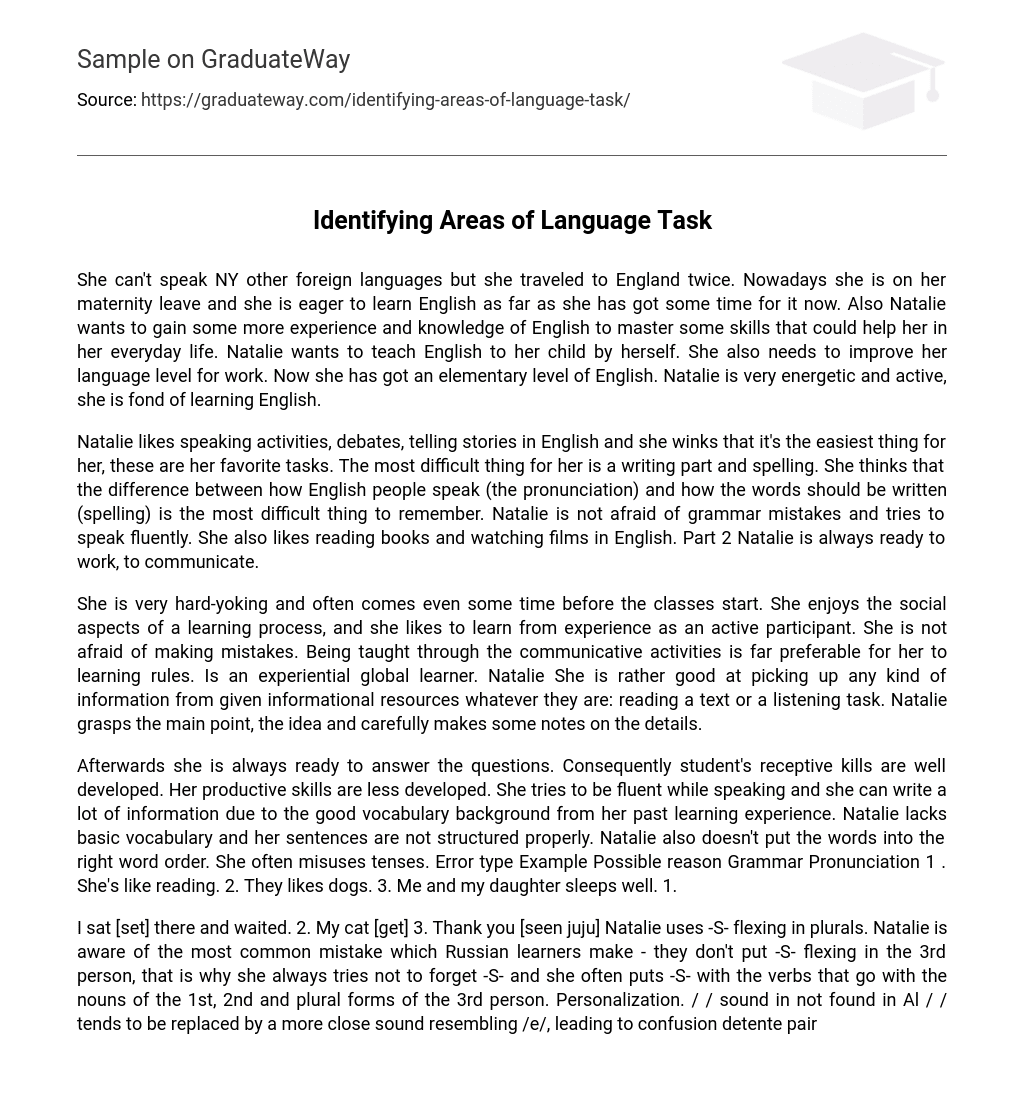She can’t speak NY other foreign languages but she traveled to England twice. Nowadays she is on her maternity leave and she is eager to learn English as far as she has got some time for it now. Also Natalie wants to gain some more experience and knowledge of English to master some skills that could help her in her everyday life. Natalie wants to teach English to her child by herself. She also needs to improve her language level for work. Now she has got an elementary level of English. Natalie is very energetic and active, she is fond of learning English.
Natalie likes speaking activities, debates, telling stories in English and she winks that it’s the easiest thing for her, these are her favorite tasks. The most difficult thing for her is a writing part and spelling. She thinks that the difference between how English people speak (the pronunciation) and how the words should be written (spelling) is the most difficult thing to remember. Natalie is not afraid of grammar mistakes and tries to speak fluently. She also likes reading books and watching films in English. Part 2 Natalie is always ready to work, to communicate.
She is very hard-yoking and often comes even some time before the classes start. She enjoys the social aspects of a learning process, and she likes to learn from experience as an active participant. She is not afraid of making mistakes. Being taught through the communicative activities is far preferable for her to learning rules. Is an experiential global learner. Natalie She is rather good at picking up any kind of information from given informational resources whatever they are: reading a text or a listening task. Natalie grasps the main point, the idea and carefully makes some notes on the details.
Afterwards she is always ready to answer the questions. Consequently student’s receptive kills are well developed. Her productive skills are less developed. She tries to be fluent while speaking and she can write a lot of information due to the good vocabulary background from her past learning experience. Natalie lacks basic vocabulary and her sentences are not structured properly. Natalie also doesn’t put the words into the right word order. She often misuses tenses. Error type Example Possible reason Grammar Pronunciation 1 . She’s like reading. 2. They likes dogs. 3. Me and my daughter sleeps well. 1.
I sat [set] there and waited. 2. My cat [get] 3. Thank you [seen juju] Natalie uses -S- flexing in plurals. Natalie is aware of the most common mistake which Russian learners make – they don’t put -S- flexing in the 3rd person, that is why she always tries not to forget -S- and she often puts -S- with the verbs that go with the nouns of the 1st, 2nd and plural forms of the 3rd person. Personalization. / / sound in not found in Al / / tends to be replaced by a more close sound resembling /e/, leading to confusion detente pairs such as sat and set (Swan, Learner English 2nd Edition, p. 146) assimilation Lexis 1.
My profession is director now. 2. I go to my job. 3. I bought very rich dress. “There are quite a few words that sound similar in English and Russian, but that have different meaning or shades of meaning. ” (Swan, Learner English 2nd Edition) We’ve found out later that she has got a job of a head event manager, but it sounds in Russian like -director-(False friends) Job – like occupation or your position, your duty. You can’t go there because it is not a place. Work – it’s a place where you do your job. This mistake is like in Russian. Rich is used only about people and places. Things can be expensive or cheap.
Part 3: Identifying Areas of Language Development Since grammar mistakes are very common with the students, would suggest Natalie some written exercises to start with. After having some written sample and having done some written practice Natalie would have a clear model of using -s- flexing in the 3rd person of singular forms. I would highlight the form in the class asking As questions about their partner. Then I would do some vocabulary revision of everyday life activity. I would offer them an adapted grammar exercise from English Grammar In Use by R. Murphy. Unit 2 Present simple Ex. 2. 1 2. 2. 2. . Having checked the exercises, I would ask As to write short stories about their friend’s or relatives everyday life activities. In the final stage I would ask As to exchange their stories and decide what fact would be the most interesting or unusual for them to know about. They are supposed to tell short stories using 3rd person flexing -S-. As there is no such a sound in Russian language it WOUld be useful to drill pronunciation of this sound with all As. Will write the transcription on WEB. I will give them one example as a model. Then we drill the list of the words together, the whole group.





